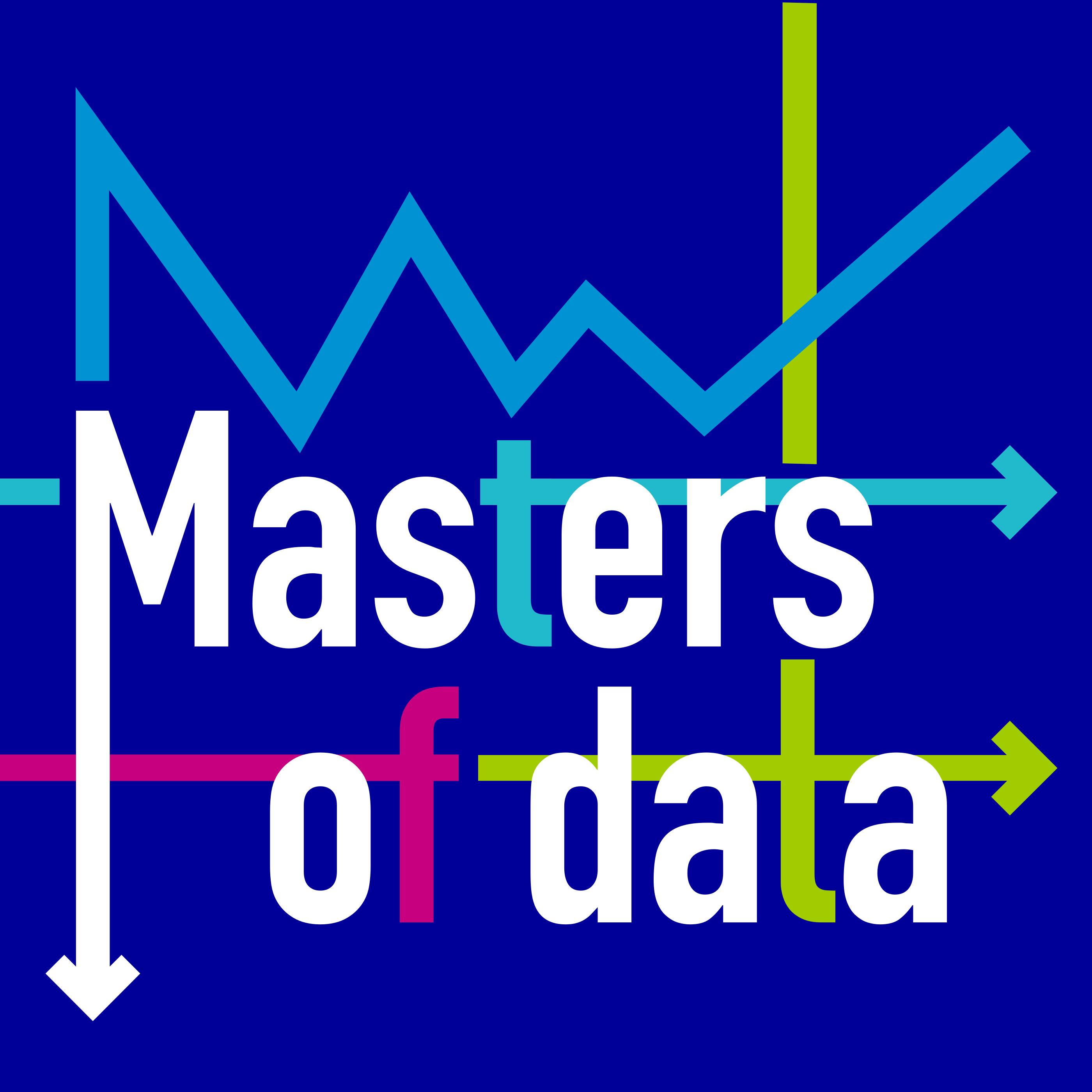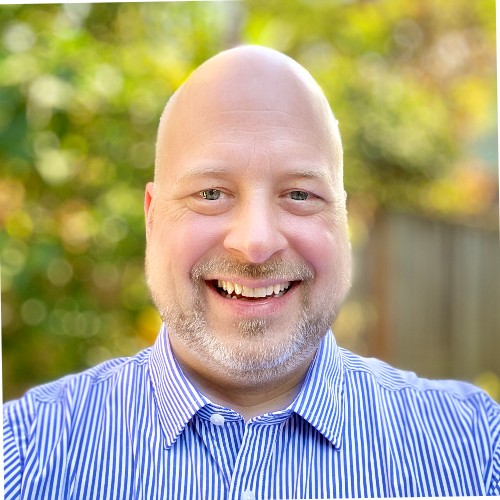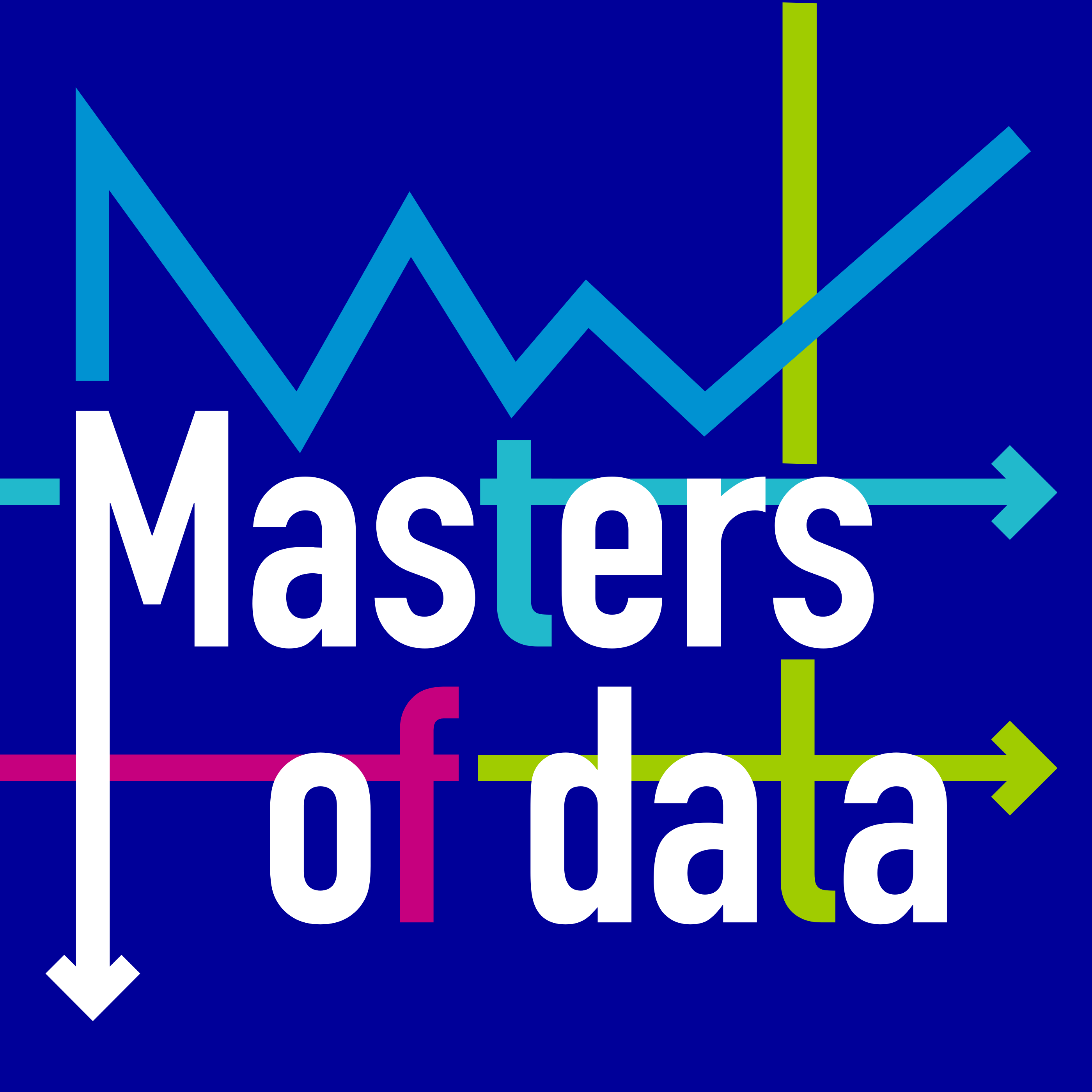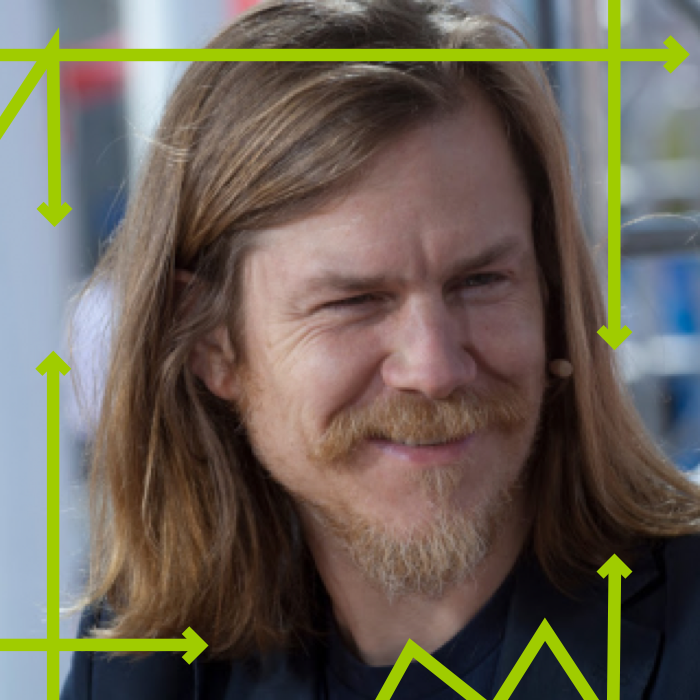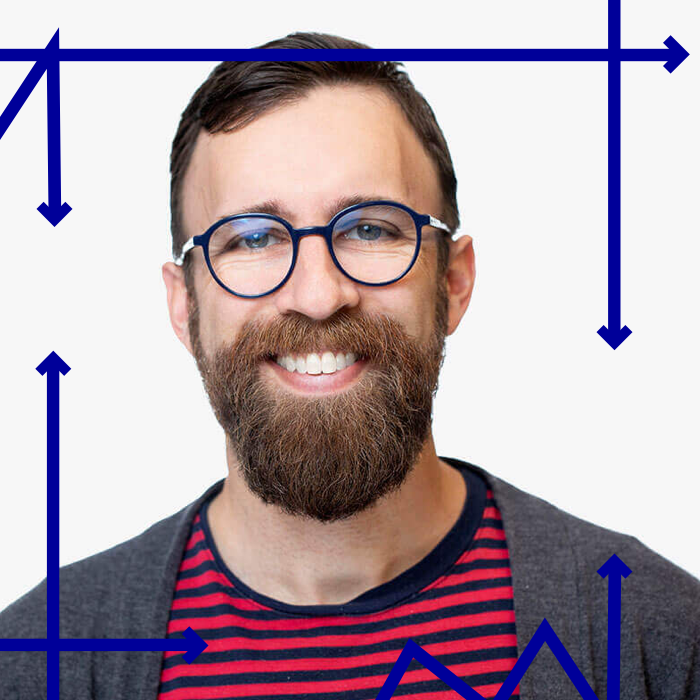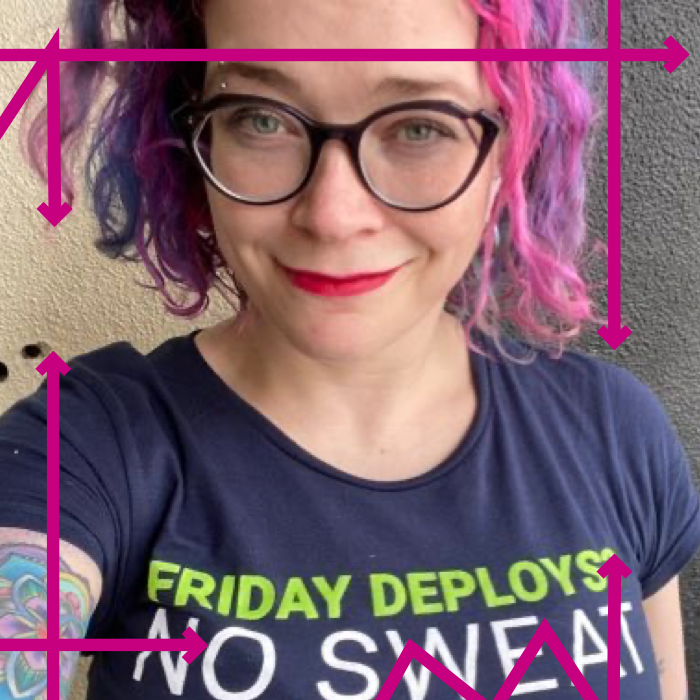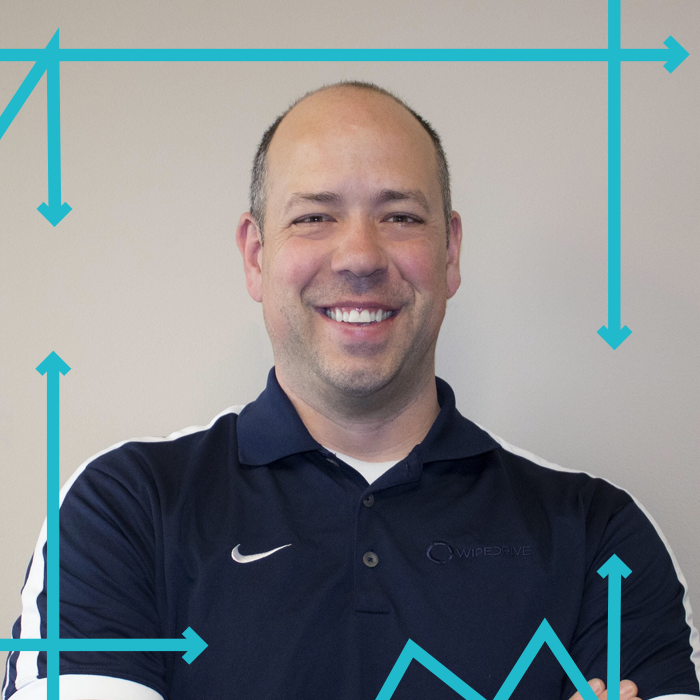Moving from Artificial Intelligence to Artificial Wisdom (Guest: Yoon Lee)
- 0.5
- 1
- 1.25
- 1.5
- 1.75
- 2
Ben: Welcome to the Masters of Data Podcast, the podcast that brings the human to data. And I'm your host, Ben Newton. Our guest today is at the intersection of innovation and creation at one of the most important technology companies in the world. Yoon Lee is the Senior Vice President and Division Head of Content and Services and Product Innovation at Samsung Electronics America. In today's world, our lives are connected to our devices in a way inconceivable even a few decades ago. Yoon is in a unique position to understand how devices, software, data, and content all come together in our digital lifestyles, and what that really means. So without any further ado, let's dig in.
Ben: Welcome, everybody, to the Masters of Data Podcast. And I am here in the local Samsung Electronics America office in Mountain View with Yoon Lee. He's the SVP and Division Head of Content and Services and Product Innovation at Samsung Electronics America. Thank you for bringing me in.
Yoon: Well, thank you for having me.
Ben: We've been talking a little bit about your background and stuff you're interested in. I'm very excited to have this conversation. I always do, even when I start off these interviews, is to humanize you. You know, where did you come from? You really seem like you've had an interesting journey to get where you're at here with Samsung. So tell me a little bit about you, what's your story?
Yoon: Sure. I'm a trained engineer and I love engineering, particularly mechanical engineering because in British term, I'm kind of known as the petrol head. So I tinker around with cars, I love cars. I participate in track days and garage sessions and all that kind of stuff.
Yoon: So I think since birth I thought I was going to be an engineer. I can't recall how man Matchbox's that I lost in the sandbox that I used to play. Because I mean, seriously, that's all I did.
Yoon: I attended University of Michigan for my bachelor's simply with one focus of being able to create cars. So that was back in the early '90s. Instead of going into the OEM, I actually joined a robots company. And the reason why I joined a robots company, for two reasons, number one, if I joined say like one of the OEMs, like the big threes, then I realized, "Hmm, then I have to just drive one brand." And that was kind of something that I didn't want it to do.
Yoon: And then at the time, robotics was really booming, early '90s, late '80s. I joined a robotics firm and I worked as a robot design engineer designing motorspec-ing, you know, sizing the motor, reach, stability of the robot and things like that. Because I'm not originally from Detroit, it was a very, very tough environment, first and foremost, by the weather. And then secondly because I'm from Korea. I kind of miss being closer to the west coast. I did spend about a year and a half in Palo Alto when I was growing up.
Yoon: So I decided to look for something else, so I applied to all the west coast schools for PhD opportunities, and Berkeley picked me up, fortunately, so I came to Berkeley and I continued on studying manufacturing in the mechanical engineering field.
Yoon: Then a moment came when I actually went to business school and took a class in what is known as consumer-driven innovation or product development. Up until then, I thought the only way to make product is becoming an engineer. But then I did realize that there's actually a higher level force that actually pulls everything, so by understanding consumers, by understanding their behaviors. It was actually a much more fun way to product things. So that kind of made me to change my career.
Yoon: From that point on I came out of engineering world and then still remained in the product development space. But instead of doing engineering product development, I became more of a consumer ... You know, like studying consumer behavior, consumer attributes, defining what consumers want and need, kind of that angle, which led me to my consulting career.
Yoon: Samsung was one of my clients back in the mid-2000s. Back in 2000, Samsung was just overtaking Sony as number one device manufacturer. Up until then it was really easy for Samsung to do product development. Basically like if our competitors put out something, we acquire the product, we study it, and then we make it faster, better, cheaper, and then we reintroduce the product. The consumer value proposition was already defined by our competitors.
Yoon: Fast-forward a few years, now that there's no product or leader between us and the consumers, we were in the position of studying consumers to create those value propositions. So that's when I came in to help Samsung with the process, the capability framework, all of that. Samsung offered me a job basically saying like, "Since you consulted with us, do you mind running the organization." So that was the genesis of me joining Samsung and becoming kind of an internal, customer-driven ... Creating internal organization for customer-driven innovation, putting new processes on developing products when there's no benchmark products to look into. The only benchmark is consumer mind.
Ben: Yeah. That's a fascinating process. And that was a new division here locally in Silicon Valley, right?
Yoon: That's correct. Yeah.
Ben: So did you actually start that or did you kind of take it over when it already started?
Yoon: Yeah. I was employee number one so to speak. I sourced everything from locations, office space, the tools that I need to buy, and recruiting people. So that was 2006.
Yoon: We had a pretty big success in 2009 with a camera product that we launched a time where ... Samsung is longer in the camera business, but that lead into opening up other offices around the globe. So we opened up offices in London, Beijing, New Delhi in India, where local consumer insights are very distinct, and the market is big enough for us to create something specific for them. It's been a wonderful ride since then.
Ben: What was that like coming in, bringing Samsung into this area. Was that a challenge or just kind of a natural progression?
Yoon: It was a huge challenge, and it's still a huge challenge because our heritage is OEM. We get specs from whoever is giving us the order, and then we produce the best hardware possible, and then we supply that to our ... We're basically hardware vendors to the OEMs. That was our heritage.
Yoon: And what I've been noticing is that it's very difficult to move culturally from one culture to another culture. It's almost like changing your entire gene. And once it's created, genes, you know, DNA is DNA.
Ben: Good analogy.
Yoon: It's very difficult. Yeah, it's very difficult to change. We've been steadily, slowly changing this, but I have to say it's not the most straightforward of doing this within a company culture like Samsung where it's predominantly hardware, it's predominantly manufacturing-driven.
Ben: Is the office here specifically where we're at now? Is this more the consumer-driven set of products or is it ... What's kind of the breadth of research and work that you're doing here?
Yoon: It's mostly consumer-driven products. So we have two big businesses. One is semiconductor business, and the other one is consumer-driven product business. Semiconductor business is actually very different from consumer-driven products.
Ben: Yeah. That makes sense.
Yoon: Because it has a goal, a stated goal that's very clear. Like next time we'll produce something that's half the size.
Ben: Little more density.
Yoon: Yeah, and twice the speed.
Ben: Right.
Yoon: So it's a performance goal, and it's a very ... You know, if we can do that for the same amount of money, there's no one who would refuse that, right?
Ben: Yeah.
Yoon: It's more engineering-intensive work because the goal is very well-defined. Whereas it is next to impossible to define consumer goal. How do I know what you want or what you like in a very absolute scale? Usually it's all bell-curved. And sometimes even if it looks like it's bell-curved, sometimes you're able to disturb at the tail ends of the bell curve, and that becomes kind of the norm as well too in certain cases. So the two worlds are very different in terms of how you conduct business.
Ben: No, that makes a lot of sense. It's funny, you reminded me, I'm listening to a book now about economic history to US, and it talks about how Henry ... I'm listening to the part about the car business right now and how they first developed the cars. It's interesting to say that because that was, I assume to be, once difference that Henry Ford in the early times made from other car manufacturers. He'd listen to customers, but he didn't do what they told him to do either. He was trying to create a new market, and that's so much harder because you had to create something they didn't necessarily know they wanted.
Yoon: Yeah. That's called insight, that's called latent needs, that consumers are saying it, but they're not saying it explicitly. So you have to interpret date from an insight standpoint, and then give your own point of view on what that means. I like your Henry Ford example because it's one of my favorite examples too. You know, like Henry Ford said when you ask the customers, they'll always want to say, "I want a faster horse," right? They will never say, "I want to go from point A to point B faster." It's up to us to take that statement, "I want a faster horse," and think about what that means. I never meant to breed a specific horse that runs faster. What they meant was, "I want to go from point A to point B faster," hence the car.
Yoon: But I think many manufacturers or many people make that mistake of taking those feedback in a literal way and try to say, "Oh, what should I feed to that horse to make it go faster."
Ben: Yeah, yeah, yeah.
Yoon: Or do they have to go on a special exercise. It's definitely a different way of thinking, therefore it's very important to just not look at the data, which is customer saying, but what does that data really say, which is taking in your insights on top of that.
Ben: You're kind of sitting in one of the most innovative companies in the world. I mean, Samsung has ... You guys have your hands in all sorts of different things. And when I was doing some research on some things you talked about, I saw Venture Beat at an event that you were at recently. And one of things I thought was really interesting, particularly since we're talking about data here, is that you've all these devices that deal in data, that use data, that interact with your customers. And you talked about moving from a content-centric to a context-centric world. And I just thought that was a fascinating expression. So talk a bit about that. What did you mean and why did you come up with that expression?
Yoon: Sure. Before I came up with that expression, content-centric was a fad word in the early 2010s up until 2014, 2015. The reason that became so popular was the emergence internet, wireless, and connectivity, right. So if you go back to say 2000 ... I would say '10, '11, '12, that timeframe, you heard this term called connectivity and convergence. People wanted to see content in one screen, go outside, and continuously pickup that content in the second screen. It was all about kind of convenience, right. And I think people saw this trend of, "Oh, you know what? Maybe with this fast internet and the wireless technology, now you should be able to do that kind of thing."
Yoon: So before the content-centric world, in my mind it was a device-centric world.
Ben: Yeah, that makes sense.
Yoon: Because device has to have the capability to really ... It had to have the horsepower to do what you want.
Ben: It was a limiting factor.
Yoon: Yeah. Because if you had a faster processor empowered with a very good resolution device, the experience of looking at content on that device is so much better than the other device, right. So it was a complete device-centric world.
Yoon: Then that got saturated. And then with the connectivity technology, then people moved on to thinking about, "You know what? It's really all about the content because the device is now generic. The experience from one device to another device is all about different size, location. Now it has to be content because that drove a proliferation of studying like signal processing technologies and connectivity technologies, because you want to move content from one location to another location in an extreme, fast way.
Yoon: We're now living in a world where now you start demanding your own preference. And it's a very classic three-step evolution. First it's the device. Then once you have experience with the device, then you demand, "Oh, I wish it does this. Oh, I wish it does that," right? And then the third level is what else is out there? Surprise me. Tell me what you can do because now ...
Ben: It's almost too much.
Yoon: Yeah. Now I know what can be done, you need to tell me what needs to be done. That's what I mean by context. So everyone has different context. The advancement in AI and other technology that can curate to your needs and behaviors are really moving not just content-centric, but now putting you as the center, your context at the center.
Yoon: And it's different. Everybody has different contexts. For example, what's really bizarre is I start watching YouTube, but then in the bed I actually close my eyes and then I listen to YouTube. It's a very bizarre behavior, but that's my behavior. In that case, let's say if I started watching YouTube on my mobile phone, when it sees that I'm actually in the bed, mobile phones should actually turn off the screen to save battery and just broadcast the audio to me. I mean, there's no reason to continuously have the phone on, right?
Ben: Right.
Yoon: That's my context. So context really means that you have the content, the device, and all the connected technology has to know specifically what you are looking for, and then kind of cater up to that instead of content being available everywhere or instead of device being the hero. It's you, the hero, now.
Ben: And you used a term that I like to ... If I can get it right, "The connected lifestyle." So this is basically the life you live connected to your devices, right?
Yoon: Yeah. Yeah. Yeah. Let me kind of take you back because it's always easier to use an analogy. You know like back in the day ... I'm really taking you back because it's kind of fascinating. Back in the day before the era of popular cellphones, right ...
Ben: Yeah.
Yoon: Or maybe even cellphones, right. The way I meet you is I give you a call, we set up a time, far in advance if it's even more important, and then we make our lives around that event.
Ben: Right.
Yoon: Right. So basically I'll say, "Hey, let's meet like a week and a half from now on at 10 o'clock." That's a fixed event. Because I'm not connected to you, and there's no way of connecting with each other, right, we need to basically craft our lives around those constraints. What do we do now? We don't even sometimes pick a location 10 minutes before our meeting time because we have this security that I'm connected to you. Not only that I'm connected to you, I'm connected to the internet, I'm connected to the venue. I can always shuffle things around and it can be shared instantly. That's what I mean by connected lifestyle. So in the past, if there is a milestone, important milestone, and if your lifestyle was being adjusted to that milestone, now milestones are being adjusted to you.
Yoon: So you and I have [inaudible 00:16:30] milestone, but maybe the more critical thing is the time of the day or maybe even the time of the day could shift because I can always ping you and say like, "Hey, can you move it up by 5 minutes or 10 minutes? Can we push this to the evening?" We have the freedom of doing that, moving milestone around your lifestyle because we're connected. That's what I mean by connected lifestyle.
Ben: That means there's a fluidity that you didn't have before.
Yoon: Yeah, exactly. So seriously, what that means is that now everything evolves around you. You are being at the center. And it kind of goes with the context-central way of thinking. It was the device in the middle, then it became the content in the middle. Now it's you, your lifestyle in the middle. And that lifestyle happens to be a connected lifestyle.
Ben: So the world does in fact revolve around me [crosstalk 00:17:18].
Yoon: Exactly. Yep.
Ben: So now with all the devices that you both produce and that you're working with, and producing massive amounts of data that basically either directly or indirectly talked about that lifestyle ... That what you're doing when you go inside your house, when you pick up your phone, whatever it is. Now how do you then take that to provide that contextual kind of package that you're talking about? How do you actually do that?
Yoon: I might have a bit of a difference in point of view about data. When I was a robot engineer way back in the early '90s, there were all kinds of control theories. It was very mathematical. And those control theories were there because in order to achieve a certain level of accuracy, you needed a lot of data and processing power. But at the time, computers weren't fast enough to get to that accuracy. So there were a lot of algorithms and theories to predict your accuracy to compensate for that lack of processing power.
Yoon: Fast forward to now, those control theories are mostly not used anymore because the computer is so powerful. All you need to do is just process all that data and then it's fast enough that you'll get to ...
Ben: Can actually process it all.
Yoon: ... An accuracy that you want to go. In the more engineering term, it's called PD controller. It's basically using the differentiator and the integrator to control your data. That's how you do it these days, right. I think because you can process the data, right ...
Ben: Right.
Yoon: ... I think big data is coming in at an angle where maybe it might not ... Even if you don't really need that much of data, just because you can process all the data ...
Ben: You do it anyway.
Yoon: You do it anyway, right. And I don't know if that is the correct way of doing it or not because then what happens is that I think sometimes you lose the ability to kind of see the wood and just kind of focus on the trees too much. Because of that, I think there's definitely an angle where big data is so much more powerful and useful. But applying big data to all corners of behavior studies and things like that in my mind is a bit of an overkill.
Ben: You know, one term that comes to mind in going back to the engineering terminology here, I mean, when I was studying physics we used to talk about precision versus accuracy. Sometimes it feels like big data and these kind of data analytics approaches give you the sense of precision, but are they really accurate? Because back to your point about it's the people that matter, so you can say something really truly accurate about them about something they did with the device or something like that, but is it actually accurate to what matters to them? Is it actually connected to who they are? Maybe not. Maybe it's just a useless piece of data, even though it's incredibly precise.
Yoon: I like the term that you just used, "Precision versus accuracy." I agree with you wholeheartedly that big data will give you that precision, but unless you understand the underlying intension, it's not going to be totally accurate.
Ben: Yeah. So what do you do? How do you get around that?
Yoon: You have to accept the fact that human thinking is malleable, that human thinking is gray, human thinking is not black and white. And I think trying to define human behavior, human thinking in a black and white way is actually causing a lot of problem. And when you start accepting the fact that human thinking is gray, then I think data should be used as more of an assistant or a way to kind of assist with your decision making. Not necessarily it shouldn't be the barometer for making the decision. So I think the decision still has to come with contextually relevant human thought.
Yoon: For example, if you want to make a good business decision, in my mind you have to be contextually well, well trenched into that field. What I mean by that is if you just present a data to a management that has absolutely no interest in a certain field, I don't know how that person can make a very sound and informed decision.
Yoon: So if you want to be a good manager or if you want to be a good leader, I think the first and foremost thing is instead of becoming an expert in data, you have to become an expert in that field and then try to understand the name of the game so that you have your own insight, then you have your own context. Then you look at the data, and it's really up to your contextual ... Ability to synthesize the data with your context into the new level of insight and produce what's more relevant or what's the human decision.
Ben: That reminds of ... You know, because we were connected through [inaudible 00:22:20] and one thing I remember reading, the way he put it, was the levels of mastery. You know, you go from just the beginner to where you don't even know what you're doing, to start learning rules and you can follow those rules. But then you work yourself up to mastery. And when you're a master, you're not even thinking about the rules anymore, you do it by intuition. You do it by instinct. And I was having a conversation with someone the other day just about this is that there's a tendency particularly in technology, I would definitely assume you've seen this, where there's a ... Since you get a couple of smart kids in the room straight out of college, out of a master's degree program, you put them in a room, they can solve any problem. And it devalues the sense that actual experience and understanding and interacting with other humans over 10, 20 years of a career, you start to build an intuition that you can't explain, but you can process vast amounts of inputs quickly and come up with an intuitive answer that actually is very close to accurate.
Ben: And it seems that's partly what you're getting at is you have to combine that human, amazing ability of human intuition to process inputs with the power of these data tools.
Yoon: Yeah. I think in part it's actually because we're in a transitionary society. So what that means is that a lot of the decision makers, upper-middle management to upper management, weren't exposed to the new tools and the new technologies. So it's very difficult for them to speak that language. So when you hire young engineers, you tend to believe that because you just don't have that context, you almost want to believe what they do will solve the problem. If those young engineers become in their 30's, 40's, and 50's and be able to become the master in certain fields of technology, I think a lot of these transitionary problems in my mind will go away. You could almost argue, "Yeah, but by then there'll be another technology that they don't understand." Yeah, that's true too. I really believe that we're living in a, I call it, compounded technology transition period where it's been stagnant for a long time and suddenly it's spiking so fast that in the upper management, on top management level, they don't really understand what those technologies really mean. Yet they still are in a position to make decisions, right. So I think there's bit of a chaos going on right now.
Ben: That's an interesting way of putting it. I've even heard people using the term fourth industrial revolution or something like that where there's something seismic going on that it's a little hard to define, but there's clearly a before and after moment going on right now.
Yoon: Yeah, yeah, yeah.
Ben: One thing that you mentioned a little bit before and we had talked a little bit about is this ... You know, we're talking about the interaction between human and AI as well. So clearly you guys got your hands deep in that. There's a sense too, back to exactly what we're talking about, there's a sense in some corners that artificial intelligence, machine learning to solve all these problems ... But what we're seeing is when they're applied to real human problems, they lack the humanity. And then they end up sometimes making things worse or causing all these problems.
Ben: So how do you see that from your vantage point about how you tie into technology about everything we just talked about?
Yoon: I personally think AI is very important. I think machine learning is very important. It's kind of the next steps moving from my content world to the context world because it's intelligence, right. Intelligence, what makes it contextual. Machine has to learn that it adapts to how you want to change.
Yoon: But the gap still lies in the level of grayness, right. And I think the more intelligent, the more machine starts learning, I think this need for having this gray area not being solved will become even more prominent. When you drive down the road, there's an efficient way of making your trip always. You know, I commute long. I commute to Mountain View from Oakland. Obviously you always look for the fastest route. In that type of solution, right, the AI and machine learning, studying the traffic pattern will always give you a better answer, it will give you always better decision than the human. However, I'm also a motorcycle rider. There are certain times that I just want to take a longer route simply because I want to clear my mind. What do you do in situations like that? That's not the efficiency, that's very different from a contextual learning, but it does reside within.
Yoon: So I think if we truly come to a pinnacle of AI, I think the artificial intelligence will actually live and breath with you. It'll contract and expand with you so that at some point it'll know when to release it out.
Yoon: You know it's like when you're married and having a marriage life. Sometimes everything kind of works almost like a machine, but certain times you just have to release it. That's what makes the bond stronger afterward. So I think that type of ... It's very difficult to explain this in a technical term because it's not a technical term, but I think that type of mechanism will have to get studied into how do you release at certain points by understanding my intention or my behavior and then just kind of release it out.
Ben: You mean kind of stepping ... Because a lot of this is rule-based. Because in some sense when you build these algorithms, you're basically encoding rules at the end of the day, right. So it seems like part of what you're talking about is sometimes rules need to be broken. Rules need to be changed to adjust just because the very fact of following rules all the time actually sometimes makes those rules an imprisoning element.
Yoon: Yeah, yeah. So another example that I'd like to give is in college, the best professors that lecture the best isn't the professors that research the best. It's the professors who actually learned those subject matters, digest them, and actually give you the best narration or just ... Those who are telling the best story, right.
Ben: Yeah, yeah.
Yoon: It has nothing to do with the intelligence or how much they know. It's all about telling the story right.
Ben: And connecting to you.
Yoon: And connecting to you. At work, right, and I think you probably agree with this very violently. It's not the smartest people who actually advance at work and become ... Hold important positions. It's the ones who actually communicate the best, it's the ones who actually know when to retract, know when to expand, and just do that human ... Not intelligence, but more like wisdom, right.
Ben: Yeah.
Yoon: So I think that wisdom piece is what makes people successful, not the overall intelligence. You can't be dumb and have wisdom. In order to have wisdom, you have to have some level of intelligence. So I think this AI, artificial intelligence, if it reached to a level where we can call it artificial wisdom, I think that's going to be when we ... It'll be much more contextual to you.
Ben: I like that. One thing, though, what you say too, it makes me think about I've had a couple conversations about this is that there seems to be something about there too one of the reasons why those people can connect to you is because they care. The only way you can actually connect with someone on a real level is because you actually care about the problem you're solving. You care about the situation. And that seems to be one of the hard things here too is how do you teach AI to care because that seems to be one of the connecting issues between intelligence and wisdom. I love that; I love that connection because partly what seems to be part of what wisdom is to actually care about the solution.
Yoon: If you kind of go back to my earlier statement of first it has to perform, which is like device-centric, and then the device has to be able to perform based on your specification, which is more content-centric. And then once that's done, it has to perform based on your expectation. I have this kind of expectation, can you do that, which is more context-centric. I think in the AI world, it's still in the device-centric world. If AI was a product, I think it's still in the device-centric world. Regardless of whether it provides care or other higher level order, it still in my mind has to be so focused that when you use a certain solution that utilizes AI, it just has to give you answers like this. It has to provide you the convenience so that you start trusting it. "Wow, this thing is so quick it gives me this accuracy. This is trustworthy." I think that's the first level of milestone. We're still not there yet.
Yoon: So even though I do mention about artificial wisdom, for example, that's like the third level of AI, right. So I think this being AI as an extremely competent product-centric world will probable come within the next year or two. Once that's done, then I think human will start demanding all sorts of parameters to that AI. Hey, instead of giving me answers to this domain, I want the answers to be expanded to several domains, for example. And that's kind of becoming more like the content-centric world, the second level of maturity. Once that's reached, then I think to your earlier comment, it'll start caring about human because that's about meeting your expectations.
Ben: No, that makes a lot of sense. And I really like the way you talk about that maturity model. So I think in particular kind of tying a bow on all of this, particularly since you are heading up product innovation here, I would assume a lot of what your job is to be thinking about the future and where Samsung is going, what are you thinking about? What are the things that are kind of engaging right now that you don't think are necessarily rising to the surface for everybody else?
Yoon: Yeah, well, I think there's kind of an unspoken expectation by everyone, both consumers and industry, what's next beyond cellphones? And that keeps me up at night, seriously, because it's a very hard problem. People say like, "Oh, it's the content world now. It's the context-world. Device is irrelevant." Things like that. But yet you can't communicate unless you speak, where voice is the mechanism, right. You can't communicate unless you have a pencil, where pencil is the mechanism to transfer your idea. You can't really stay contextual or whatever unless you have certain devices to interact with, right. So cellphones for the most part is actually playing that role. With the importance of content and with the importance of service, with the importance of all these software-driven AI or even artificial wisdom or whatever it may be, still there has to be some level of what's next from a device standpoint kind of paradigm to encapsulate all of that.
Yoon: So I don't know what that is. I think it's important. I think everyone is struggling to find out what that is. People say that's wearable. I'm not quite sure if it's wearable, but wearable is actually picking up quite a bit lately because of that thinking. There's a lot of requirements being generated now. In my connected world, I want to be able to do this. Every time I step out of my home, I've been routinely checking how much it'll take to go to work. I'm tired of doing that every time. I want the machine to feed that to me. What device would be the best way to do that? I don't want to look up cellphones anymore. Should that be embedded into my fabric or should be embedded into some sort of wearables? I'm sure a lot of people are really thinking about that these days. What's cellphone 4.0? What's next?
Ben: Yeah. It sounds exciting. I think you've got some work ahead of you here. I appreciate the time. Yoon, this has been a fascinating conversation, and I think you've got an amazing perspective. So I appreciate you taking the time to speak with me.
Yoon: Thank you very much and thank you for your time.
Ben: Absolutely.
Speaker 3: Masters of Data is brought to you by Sumo Logic. Sumo Logic is a cloud-native machine data analytics platform delivering real-time continuous intelligence as a service to build, run, and secure modern applications. Sumo Logic empowers the people who power modern business. For more information, go to Sumologic.com. For more in Masters of Data, go to Mastersofdata.com and subscribe and spread the word by rating us on iTunes or your favorite podcast app.
Page of
DESCRIPTION
Our guest is at the intersection of innovation and creation at one of the most important technology companies in the world. Yoon Lee is the Senior Vice President and Division Head, Content and Services, Product Innovation at Samsung Electronics America. In today’s world, our lives are connected to our devices in a way inconceivable even a few decades ago. Yoon is in a unique position to understand how A.I. and an understanding of the human context can make for better experiences for users.
